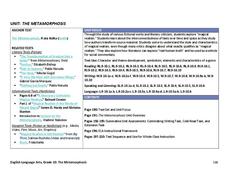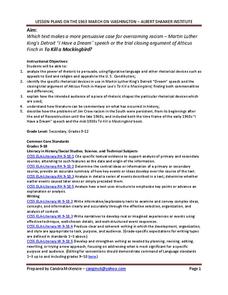Royal Shakespeare Company
King Lear Teacher Pack 2013
The King Lear Teacher Pack 2013 is designed to prepare pupils for watching the Royal Shakespeare Company's film version of King Lear. The eight activities in the pack help learners unpack the themes, events, and language of Shakespeare's...
Echoes & Reflections
Jewish Resistance
Resistance to the Holocaust took on many forms. Learners explore the passive and active resistance of Jewish people who continued their practices and observances, as well as organized resistance against the evils of the Nazis. An...
Echoes & Reflections
The "Final Solution"
Nazi policies shifted from deportation and imprisonment to extermination of the Jewish people in death camps in the "Final Solution." Learners examine photos of artifacts, read poetry written by survivors, analyze testimony from...
Echoes & Reflections
Survivors and Liberators
The end was just the beginning. The period immediately after the end of World War II and the Holocaust is often called "The Return to Life" as survivors looked to reunite and recreate broken families and shattered lives. A two-lesson...
Echoes & Reflections
The Children and Legacies Beyond the Holocaust
Using video testimony, primary source documents that detail international agreements, and structured discussions, learners consider the precarious position of children during the Holocaust and other international conflicts, and how to...
Echoes & Reflections
Rescuers and Non-Jewish Resistance
What does it mean to be a rescuer during the time of the Holocaust? Learners consider the role of those who resisted the Nazi invasions, including hiding Jewish people, throughout Europe. Activities include listening to the testimony of...
US Institute of Peace
Simulation on Northern Ireland: One Step at a Time - The Derry March and Prospects for Peace
Where does tradition fit in a divided community with violence on both sides? Scholars learn about the marches in Northern Ireland and the many issues surrounding them. They take on roles in the community and try to convince others of...
PBS
Master of the Airwaves: How FDR Used Radio to Ease the Public’s Fears
The political and economic climate during the 1930's was uncertain and tumultuous. But Americans' minds and hearts were eased with the reassuring words of their president, Franklin D. Roosevelt, and addresses over the radio. High...
Louisiana Department of Education
The Metamorphosis
How can something be true even if it didn't happen? Invite your classes to investigate the truths found in the world of magical realism as they analyze short stories, poems, informational texts, video, and art from this genre.
Safe Drinking Water Foundation
Water Bottles Everywhere
Young environmentalists examine how water bottle use is polluting the waters on our earth. In groups, your students study the handout on their assigned topic and present their findings to the rest of the class. Leading up to this...
Safe Drinking Water Foundation
Ask an Engineer
A wrap-up to the unit, young environmentalists discuss and write about the difference in perspectives of a water keeper and water treatment engineer.
The New York Times
Stress Less: Understanding How Your Mind and Body Respond to Anxiety
What could be more relevant to teens and preteens than experiencing stress? Use an article from the New York Times website to practice valuable Common Core skills for informational text reading, and also get a discussion going in your...
Curated OER
Press Review
How can word choice affect a political speech? Middle and high schoolers examine the text of the 1999 State of the Union Address, and then determine how newspaper articles and television reports describe and analyze the event. Use this...
Curated OER
Remembrance of Things Past
Engage critical and social thinking by exploring the value of language and word choice. The class considers the article "The Silence of the Historic Present" and analyzes several presidential speeches. They engage in class...
Carolina K-12
Battle Behind the Pumps
After considering the role that gasoline plays in our lives and our dependence on it as a society, learners participate in a reading activity discussing why oil prices are increasing. They will then simulate being members of a committee...
Carolina K-12
Loyalists and Patriots
Your young historians will square off as Loyalists dedicated to the English crown or revolutionaries fighting for a new nation in a role-play of a colonial town hall debate before the American Revolution.
Penguin Books
An Educator's Guide to the Works of Laurie Halse Anderson
Laurie Halse Anderson tackles challenging topics for teens. An educator's guide shares activities for many of her novels such as Prom, Shout, and Wintergirls. Questions, perfect to use as either discussion or as essay prompts, accompany...
Common Sense Media
My Online Code
Approach ethical online behavior with a series of activities geared toward teaching pupils about digital citizenship. After a brief discussion about ethics, small groups inspect a fictional social networking profile with ethics in mind....
PBS
Exploring Identity and Intersectionality in Poetry
Just as Kermit the Frog notes, "It isn't easy being green!" it isn't easy occupying "multiple Identity spaces." Class members read and discuss poems by writers detailing what it is like when their identities are "oppressed."
Albert Shanker Institute
Making the Case for Equality: A Comparison
Martin Luther King Jr's " I Have a Dream" speech and Atticus Finch's closing argument during the trial of Tom Robinson both address the societal need to overcome racism. After examining the rhetorical devices and figurative language used...
American Institute of Physics
African American Physicists in the 1960s
Physicists Herman Branson and Tannie Stovall provide young scholars with two very different perceptions of the status of African American physicists in the 1960s. After reading and comparing the bios of these two men, class members read...
American Institute of Physics
Historical Detective: Edward Alexander Bouchet and the Washington-Du Bois Debate over African-American Education
Young scientists meet Edward Alexander Bouchet who, in 1876, was the first African American to receive a PhD in Physics. This two-part lesson first looks at the debate between Booker T. Washington and W.E.B. Du Bois about the type of...
American Institute of Physics
Dr. Gates and the Nature of the Universe
What do Russian nesting dolls have to do with physics? They make a great demonstration tool for explaining Dr. Sylvester James Gates, Jr.'s string theory to young scientists. A two-part instructional activity first introduces...
American Institute of Physics
African Americans in Astronomy and Astrophysics
A two-part instructional activity focuses on the contributions to the fields of astronomy and astrophysics of two African Americans: Benjamin Banneker and Dr. George Carruthers. In part one, scholars learn about Benjamin Banneker by...

























